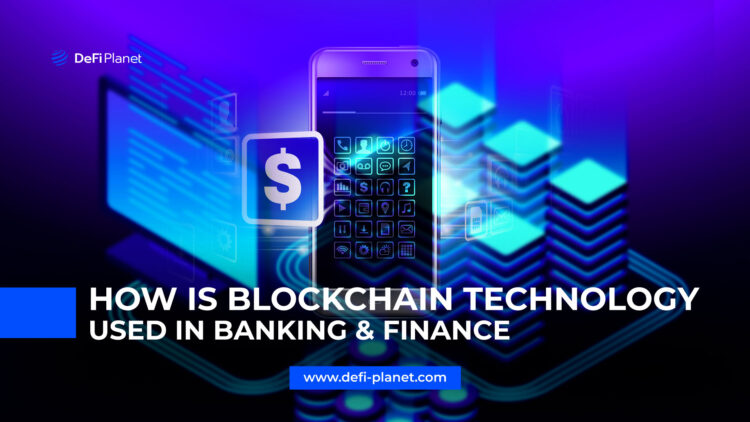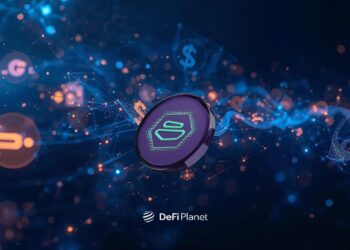Last updated on August 11th, 2023 at 07:20 pm
Imagine if you could skip the headache of dealing with complicated property purchases and endless paperwork by just clicking a few buttons. Or picture this: sending money across borders in real-time, without those annoying 5-11% extra charges and the agonizing wait of up to 10 days that old-fashioned financial systems force you to endure.
The solution that makes all these possible, blockchain technology, is already here. What’s even more exciting? You don’t need any futuristic sci-fi gadgets.
Sure, we’ve seen blockchain solutions making waves, especially the cryptocurrency market which is valued at $1 trillion, but that’s just the tip of the iceberg.
The potential of blockchain in the financial sector is so much greater. It’s not just about crypto – it’s about transforming the financial landscape through practical innovations.
This article delves into the intersection of blockchain and finance. We’ll explore how blockchain is revolutionizing the financial sector, uncover all the amazing opportunities it brings, and take an honest look at where it might fall short.
What Is Blockchain in Finance and How Does It Work?
Blockchain’s use in finance involves integrating it into existing financial systems, combining financial operations with blockchain capabilities. This covers various financial applications that can rely on blockchain’s distributed ledger technology (DLT).
The idea of integrating blockchain into finance is attributable to the former’s inherent decentralization and immutability, which ensures transparent data handling and strong resistance to unauthorized alterations.
Recognizing its potential, key industry stakeholders have adopted blockchain-powered solutions across different sub-sectors like insurance, instant settlements, asset tokenization and cross-border payments.
Predictions for blockchain-based solutions in finance hold promise, with an estimated value of $22.5 billion by 2026, a substantial increase from $280 million in 2018.

A study by Jupiter Research highlights potential cost savings for traditional banking through blockchain. They estimate savings surpassing $27 billion by 2030, showing how much blockchain integrations can advance the banking and finance industry.
Real-World Use Cases of Blockchain in Finance

Asset Tokenization
Asset tokenization presents a seamless way to convert tangible assets and investment opportunities from the physical world to the digital one.
Bonds, stocks, and ETFs, backed by real-world investments, can now be accurately represented on the blockchain through tokens.
Asset tokenization allows a broader spectrum of investors access to such assets, while also providing brokers and issuers with an efficient approach to managing their financial records.
For instance, AllianceBlock enables financial institutions and businesses to issue regulation-compliant digital assets on the blockchain. Using the platform’s advanced infrastructure, institutions can tokenize real-world assets (RWAs), such as real estate, and digitally represent them across their chosen blockchain network.
Insurance
Blockchain-based insurance solutions streamline the process of filing insurance claims, reducing delays and complexities. They also increases transparency at every stage of an insurance claim, mitigating fraud.
Ryskex uses enterprise-level blockchain solutions to offer insurance services to clients. The platform employs parametric insurance to provide straightforward insurance solutions based on predefined parameters.
Ryskex uses artificial intelligence (AI) and blockchain to verify event accuracy and automatically trigger insurance claims, resulting in faster payouts and a transparent insurance claim process.
Cross-Border Payments
Driven by factors such as transactions between raw material producers and manufacturing companies, the rising adoption of remote working environments, and the sustained growth of the e-commerce industry, etc., cross-border payments have been projected to surge to an astounding $250 trillion in processed transactions by 2027.
This significant trend highlights the need for a resilient technological solution capable of effectively handling the complexities and scale associated with cross-border payments.
Onyx, a blockchain solution designed by JP Morgan, is an example of applications that can tackle issues like this.
Leveraging the decentralized nature of blockchains, Onyx provides real-time payment solutions enabling seamless fund transfers across continents, reducing reliance on intermediaries and optimizing the cross-border payment process.
In a January 2022 trial, Bank ABC from Bahrain facilitated instantaneous payments for Aluminium Bahrain (ALBA) using Onyx’s native token, the JPM Coin.
Tax Reporting and Compliance
Blockchain’s inherent flexibility allows for customized tax reporting tailored to the specific requirements of different jurisdictions. The immutability of blockchains and the automation capabilities of smart contracts reduces the risk of errors in tax filings.
Integrating blockchain into tax reporting significantly enhances the reliability and effectiveness of the entire process.
Node40, a tax solutions firm, computes crypto taxes, offering individual and enterprise-grade tax services using blockchain-based solutions for cryptocurrency tax reporting and compliance.
Specifically designed for cryptocurrencies, this service navigates the complex crypto tax landscape, providing precise and automated tax management applicable to traditional finance.
Lending and Borrowing
The DeFi lending and borrowing market has gained considerable popularity, evidenced by the current total value locked (TVL) of $12 billion across the top 5 DeFi lending platforms.

Users can deposit assets like Ether (ETH) for long-term holding and borrow stablecoins like USDC and USDT within decentralized money markets like Aave. The borrowed funds can then be used at the borrower’s discretion.
This approach can be applied in the traditional finance sector with tangible assets by creating specific computer instructions on the blockchain (smart contracts) that adhere to established lending and borrowing rules.
This method mitigates risks associated with counterparties, and expenses tied to centralized intermediaries are reduced.
Advantages of Incorporating Blockchain in Finance
Blockchain technology offers a range of benefits for participants in the financial sector. These advantages include:
Improved Accessibility
Blockchain, particularly in products like tokenized securities and assets, enhances accessibility and promotes inclusivity.
Public blockchains like Ethereum enable the acquisition of assets anywhere in the world, right from your location. This empowers investors to diversify their portfolios across different jurisdictions, explore new asset classes, and engage with previously unreachable communities.
Enhanced Security
Blockchain introduces a decentralized data management solution that reduces dependence on centralized servers. This strengthens the security infrastructure of financial institutions against hacking attempts and system downtime. Smart contracts can be leveraged to ensure the security of managed assets, allowing only authorized asset transfers.
Time-Saving
Blockchain-based payment channels facilitate instantaneous and cost-effective fund transfers compared to traditional banks.For transactions involving physical assets like real estate, smart contracts with predefined rules simplify processes, eliminating extensive paperwork and inspections. This streamlines ownership transfers, making them more efficient and straightforward.
Fractional Ownership
Incorporating blockchain into finance expands opportunities for fractional ownership, granting regular investors access to investment avenues typically reserved for high-profile, accredited investors. This allows ordinary people to own a portion of high-value properties with small investments.
Decentralization
Blockchain reduces the need for middlemen in finance by leveraging decentralization. Real-time data feeds from sources like blockchain oracles prevent single points of failure. This cuts down on transaction fees and could improve how financial services work.
Automation
Blockchain can automate tasks like paying employees, taxes, and bills. Smart contracts handle these tasks automatically. This makes record-keeping super quick and stops errors in money transfers.
Challenges of Implementing Blockchain Solutions in Finance
The integration of blockchain technology into the financial sector faces several noteworthy challenges, some of which include:
Technical Expertise Gap
The blockchain industry, especially where it intersects with finance, lacks sufficient experts. Effectively incorporating blockchain into traditional finance necessitates a deep understanding of both blockchain technology and financial systems.
However, this specialized expertise is currently limited, which could hinder the broader adoption of blockchain beyond decentralized finance (DeFi).
Regulatory Complexities
The widespread acceptance of blockchain within finance faces a big hurdle in the form of regulatory obstacles. The absence of clear interpretations and guidelines concerning financial activities conducted on blockchain platforms generates uncertainty. This lack of clarity might slow down the integration of blockchain in finance until regulatory frameworks become clearer.
Interoperability Issues
Blockchain networks often operate in isolated ecosystems without inherent interoperability, making seamless connections between different blockchains a challenge.
Achieving interoperability usually involves adding additional layers on top of existing blockchains, leading to increased costs and potential vulnerabilities.
Consequently, customized blockchain solutions designed for various financial institutions become difficult to combine due to interoperability complexities. This limits the broader implementation of blockchain in the financial sector.
User Experience Concerns
Prominent decentralized applications (dApps) have yet to match the user experience standards set by traditional fintech and banking apps. Consequently, newcomers to these dApps often face difficulties navigating their functionalities.
Translating similar dApps for use within the finance sector could pose usability challenges for individuals who aren’t well-versed in blockchain technology, potentially leading to lower adoption rates within the finance industry.
The Future Of Blockchain In Finance
Blockchain technology has the potential to revolutionize the financial sector in remarkable ways. In the near future, individuals will be able to utilize blockchain in their financial transactions without requiring an in-depth understanding of its mechanics, much like using a banking app to pay for pizza without grasping its inner workings.
This user-friendly nature will enhance the accessibility of blockchain-powered solutions, contributing to a more transparent and secure financial landscape.
However, achieving this vision is no simple task. Establishing a robust traditional financial ecosystem that effectively incorporates blockchain (or an on-chain finance ecosystem emulating traditional finance) demands further innovations and strategic partnerships.
Nonetheless, the success of blockchain implementation in on-chain finance (DeFi) serves as a testament to the vast possibilities achievable with appropriate advancements.
Prominent financial institutions such as Citigroup and JP Morgan have already begun adopting blockchain to enhance their financial services, yielding considerable success.
The surge in blockchain’s popularity within finance can be attributed to the growing interoperability between on-chain and off-chain realms. While early blockchain networks were isolated, recent advancements have improved interoperability, yet seamless integration of all traditional financial data remains a challenge that necessitates constant improvement.
For the full integration of blockchain into traditional financial operations, establishing interoperability across all tiers is pivotal. Ultimately, through sustained collaboration between the finance and blockchain sectors to accommodate innovation, the convergence of these two industries could very well surpass the projected market size of $22 billion by the end of 2026.
Disclaimer: This article is intended solely for informational purposes and should not be considered trading or investment advice. Nothing herein should be construed as financial, legal, or tax advice. Trading or investing in cryptocurrencies carries a considerable risk of financial loss. Always conduct due diligence.
If you would like to read more articles like this, visit DeFi Planet and follow us on Twitter, LinkedIn, Facebook, Instagram, and CoinMarketCap Community.
“Take control of your crypto portfolio with MARKETS PRO, DeFi Planet’s suite of analytics tools.”





















